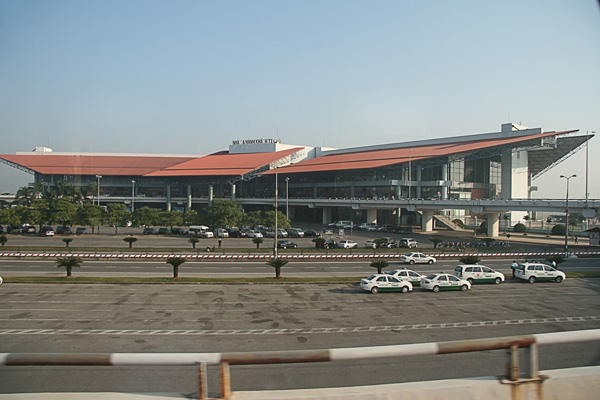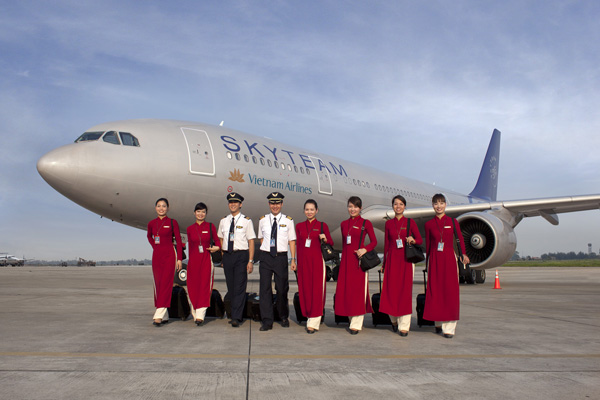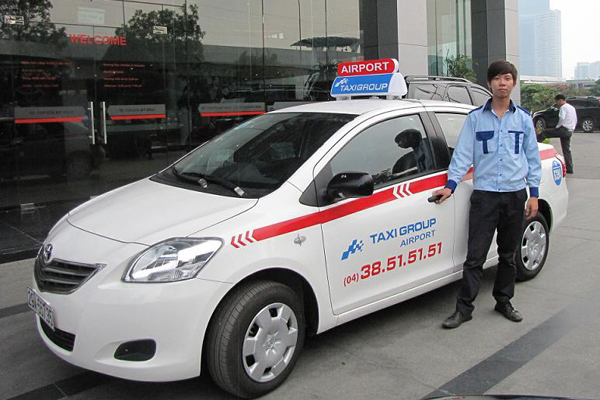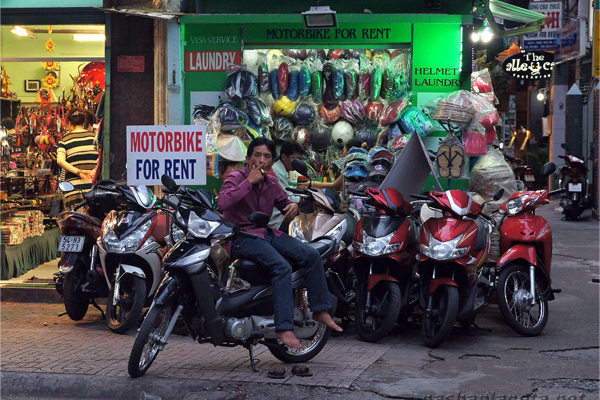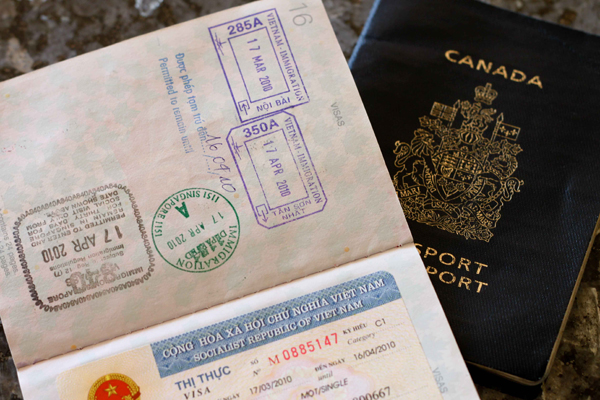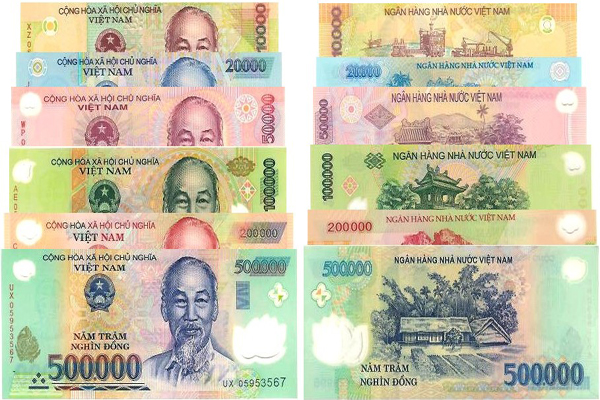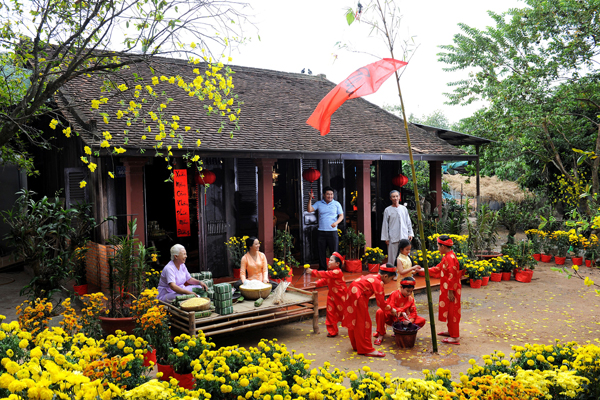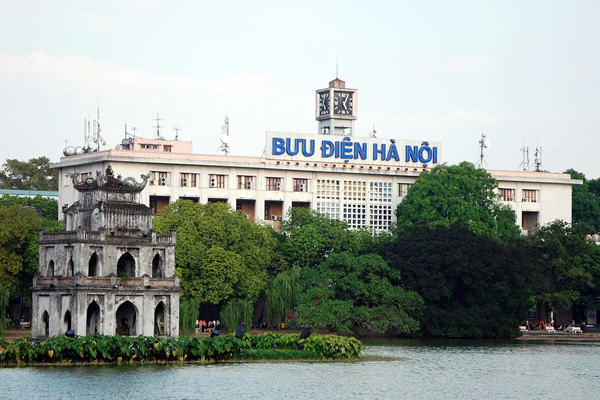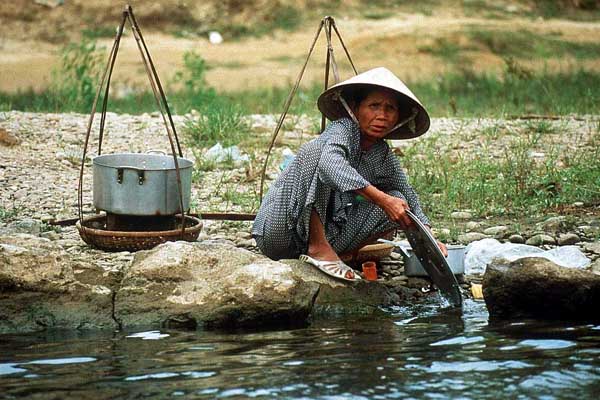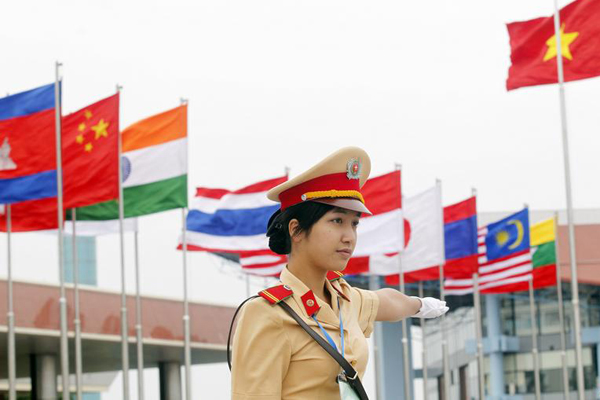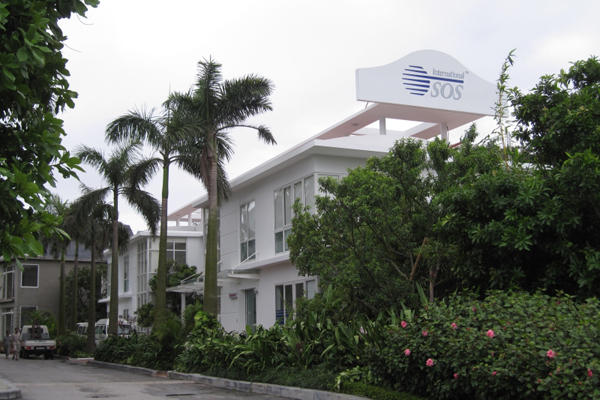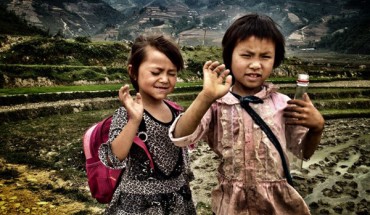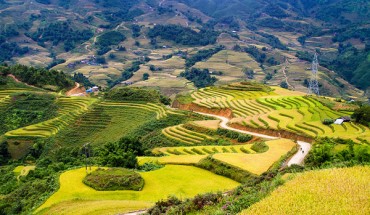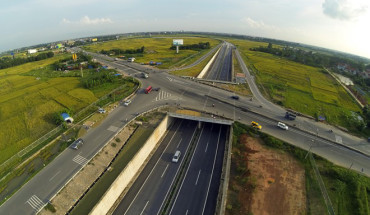Getting There & Away
By Plane
Vietnam has three international air-ports, Hanoi’s Noi Bai airport, Ho Chi Minh City’s Tan Son Nhat and Danang International Airport. There are now more than 20 international airlines servicing Vietnam with direct daily flights from Bangkok, Hong Kong, Kuala Lumpur, Phnom Penh and Singapore. Other cities with direct flights to Hanoi include Berlin, Dubai, Guangzhou, Moscow, Paris, Seoul, Taipei and Vientiane. Ho Chi Minh City has direct links with Amsterdam, Berlin, Dubai, Frankfurt, Jakarta, Manila, Osaka, Paris, Seoul, Sydney and Taipei. It is advisable to reconfirm all flights 72 hours before takeoff.
From the International Airports
– Noi Bai airport is 35km (22 miles) from downtown Hanoi. Vietnam Airlines provides a shuttle bus service to and from its central Hanoi booking office for US$4 per person. Taxis are available in front of the arrivals hall. A typical fare to downtown Hanoi would be US$20. All toll charges are usually included in the fare, but check this before getting into the taxi.
– Tan Son Nhat airport is located a mere 7km (5 miles) or 15 minutes’ drive from the heart of Ho Chi Minh City. Metered taxis are available and far better organized than in Hanoi.
– Da Nang airport located in the city of Da Nang, 10 minutes drive from City center.
– Phu Bai airport is 20 km south of Hue City. It takes 40 minutes to drive to Hue
A departure tax of US$ 12 is levied for all international flights. Domestic departure tax is now included in the ticket price.
By Road
It’s possible to enter Vietnam by land at a number of border crossings. From Cambodia, there are three crossing points: Chau Doc, Vinh Xuong and Moc Bai. From Laos: Lao Bao and Cau Treo. From China: Lao Cai, Dong Dang and Mong Cai.
By Boat
It’s now possible to enter Vietnam by riverboat from Cambodia. Ferries leave Phnom Penh via the Bassac River or Lower Mekong (which becomes the Song Hau Giang in Vietnam). The border entry point is at Chau Doc in the Mekong Delta.
By Train
Trains from China enter Vietnam at the Dong Dang and Lao Cai border posts. The twice-weekly Beijing- Hanoi train uses the Dong Dang crossing. The Lao Cai entry point links Vietnam with the southwestern Chinese province of Yunnan. If you are travelling by train, remember that China is 1 hour ahead.
Getting Around
By Plane
Vietnam Airlines (www.vietnamair Iines.com) has improved greatly over the past few years. Booking offices can be found in all main towns and cities; the staff are polite and English is spoken. You will need to show your passport every time an air ticket is purchased. The domestic air routes are comprehensive, Vietnam Airlines flying to the following destinations: Hanoi, Ho Chi Minh City, Buon Me Thuot, Dalat, Danang, Dien Bien Phu, Haiphong, Hue, NhaTrang, Pleiku, Qui Nhon, Rach Gia, Tuy Hoa, and Vinh. Vietnam has a second domestic airline, Pacific Airlines (www.pacificair lines.com.vn). It does not have the same coverage as Vietnam Airlines, but can prove useful for travel between the major cities. Pacific Airlines has an all-new fleet of Boeings and Airbuses.
By Bus
The country has a huge bus network, but travelling this way can be arduous. Roads in Vietnam are not yet up to the standards you would find in some other Southeast Asian countries. Road safety and courtesy are almost nonexistent. Buses tend to be overcrowded and prone to frequent breakdowns. If you have to travel by bus, the best option is the ‘open ticket’ air-conditioned bus which allows you to hop on and off anywhere along the bus route from Hanoi to Ho Chi Minh City (or vice versa). Contact Sinh Cafe (www.sinhcafe.com) for details.
By Train
Vietnam Railways (www.vr.com.vn) has a reasonably extensive railway network. The main line, between Hanoi and Ho Chi Minh City, is served daily by the Reunification Express. The fastest express train on the route between the two cities takes about 30- hours. Air-conditioned sleepers are available and make the trip between Hanoi and Ho Chi Minh City a pleasant adventure. From Hanoi, there are rail links to the Chinese border at Lao Cai and Lang Son. Trains are usually full and so it is advisable to book well ahead – for a sleeping berth perhaps as much as four days in advance. Travel agencies and hotels can arrange tickets.
Taxis
All the large towns have taxi services and all vehicles are metered. Sometimes, it is easier to ring the company than wait on the street for a taxi to turn up. In Hanoi try V-Taxi (tel: (04) 821 5668) or Mai Linh Taxi (tel: (04) 822 2666). In Ho Chi Minh City try Vina Taxi (tel: (08) 811 0888) or Festival Taxi (tel: (08) 845 6456).
By Car
It is possible to drive yourself, but because of the chaos on the roads and highways, it is advisable to hire a car with a driver. You can hire cars from hotels and travel agents from US$25-60 per day. One convenient way to see the country is to hire a car and driver in Hanoi or Ho Chi Minh City and drive the length of Highway 1 which connects the two cities. It’s best to allow a week to 10 days, stopping at Mui Ne, Dalat, Nha Trang, Hoi An, Hue en route. This option will cost around US$500-600.
Local Public Transport
A great way to get about most towns is in a trishaw or a cyclo. They are fairly slow, but if you have time, there is no better way to see the sights. A lot of the drivers speak some English. Taking a cyclo in Ho Chi Minh City may mean a longer journey than at first anticipated as cyclos are banned from some of the larger streets and the driver will have to make certain detours.
Another form of public transport is the xe-om (xe-ohm) or motorbike taxi. Passengers grab on to the driver’s waist and are delivered to their destination much faster than a taxi or cyclo. Safety, however, might be an issue as helmets are not mandatory in Vietnam. Important: you must agree on the price before boarding a cyclo or xe-om.
Motorbike Hire
Hiring a motorbike to get around the big cities is only recommended to those who have some previous experience. The sheer number of motorbikes in Hanoi and Ho Chi Minh City is overwhelming. Do not expect anyone to follow any rules. Cafes and some hotels will rent bikes out. Note: it is illegal for foreigners to drive a motorbike over 125cc.
Pedaling Around
Bicycles still provide the main means of transportation for many Vietnamese. For the visitor, they are a great way to see rural Vietnam (forget about cycling in traffic-heavy Haiti or Ho Chi Minh City). Bicycles can be rented from cafes, travel agents and hotels. In Hue, a bicycle is the perfect way to see the sights. In recent years, more cyclists have taken to touring country on mountain bikes. You might consider bringing in a bicyde, or joining an organized group tour. Most buses and trains will allow bicycles on board and there are bicycle repair shops in just about every town.
Facts for the Visitor
Visas
Getting a visa is essential. The time it takes to get a visa varies depending on where you are getting it, but usually a single-entry 30-day tourist visa can be processed in four to five working days and costs around US$40. The Vietnamese embassy in Bangkok has a good reputation and usually only takes four days. Visas can be extended once for 30 days and usually cost about US$30. Extensions are best processed by a local travel agent in Ho Chi Minh City or Hanoi. Make sure your passport is valid for at least another six months.
Police Registration
Internal travel permits are no longer required for visiting major tourist areas in Vietnam but hotels and guesthouses outside of Hanoi and Ho Chi Minh City may ask for your passport for police registration. The staff will return it to you the next morning. In Hanoi or Ho Chi Minh City, hotels may only require your landing card, from which they will fill in details in a book and then return it. In other places, the staff may insist on holding your passport for your entire stay.
Note: policies change constantly and often without warning. If you must turn over your passport, make sure that the correct one – and the landing card – are returned to you.
Customs
Duty-free allowances for each visitor are 2 liters of liquor, 200 cigarettes, and 50 cigars or 250g (8oz) of tobacco. Luggage and personal possessions should be in amounts sufficient for personal use. The usual prohibitions are in force, proscribed imports including weapons, explosives, anti-government propaganda, obscene materials and (sometimes) pre-recorded video tapes.
Overseas Embassies
For visa and travel information in the UK and the US, contact the respective embassies UK: 12-14 Victoria Road, London, tel: (20) 937 1912, fax: (20) 937 6108; USA: 1233, 20th Street, Suite 400, 20036 Washington DC, tel: (202) 861 0737, fax: (202) 861 0917.
For all other embassies check Vietnam’s Ministry of Foreign Affairs website at www.mofa.gov.vn.
Currency and Exchange
The Vietnamese currency is called the dong and is used uniformly throughout the country. Bank notes in denominations of 200d, 500d, 1,000d, 2,000d, 5,000d, 10,000d, 20,000d, and 50,000d are presently in circulation. As the dong is not a convertible currency, you cannot legally bring in or take it out of the country. Although most transactions are carried out in dong, US dollars are readily acceptable. At the time of press, US$1 was roughly equivalent to 15,000d. Only certain travellers’ cheques and credit cards are acceptable in the big cities: they include Visa, MasterCard and American Express.’
Most major currencies can be exchanged in Vietnam, but in reality it is better to bring US dollars. Branches of Vietcombank, large hotels and most shops will change money for you at the correct exchange rate. Don’t use street money changers.
Tipping
Tipping is not a traditional part of Vietnamese culture, but it is appreciated. If you feel you have been well- treated, a small token of your gratitude would not be out of place. Hotels and top restaurants will have already added a service charge to your bill.
Time
Vietnam is 7 hours ahead of Green-wich Mean Time (GMT).
Electricity
Electricity is rated at 220 volts. Sockets are of the standard European or American type.
Opening Times
Banks are open 8am-3pm, Monday to Friday, 8am-noon, Saturday.
Government offices are usually open Monday to Friday, 8-11.30am and 2-5pm, Saturday, 8am- noon.
Post offices are generally open every day 6am-8pm.
Shops and supermarkets are mostly open daily from as early as 6am to 9pm.
Museums are usually open Tuesday to Sunday, 8am-noon and 2-5pm, but check with individual museums.
Temples are generally open daily 6am-6pm.
Banks, administrative offices and museums, but not post offices, are closed on all public holidays and occasionally on religious festivals.
Public Holidays
Traditionally, the most important festival of the year is Tet Nguyen Dan (Vietnamese Lunar New Year) or Tet for short. Officially, it is three days, but many Vietnamese take a week off for their celebrations. It usually falls between January and February.
These days are observed as official public holidays:
– 1 January (New Year’s Day);
– 3 February (Anniversary of the founding of the Communist Party of Vietnam);
– 8 March (International Women’s Day);
– 26 March (Youth Day);
– 30 April (Liberation Day celebrating the fall of Saigon to communist forces on this day in 1975);
– 1 May (International Workers’ Day);
– 7 May (Victory over France);
– 19May (Ho Chi Minh’s Birthday);
– 1 June (International Children’s Day);
– 27 July (Memorial Day);
– 19 August (August Revolution of 1945);
– 2 September (National Day celebrating Ho Chi Minh’s proclamation of the Declaration of Independence on this day in 1945.);
– 20 November (Teacher’s Day) ;
– 22 December (Army Day).
Post Offices
Post offices are found in most towns and many have facilities for faxes and express mail services. The quickest services out of the country are from the larger cities. The main post office in Hanoi is Buu Dien Ha Noi, 75 Dinh Tien Hoang Street (tel: (04) 825 4413, fax: (04) 825 0000); in Ho Chi Minh City, the Buu Dien Ho Chi Minh, next to Notre Dame Cathedral (Tel: (08) 829 9446, fax: (08) 829 8540). Post offices offer two quick registered mail services called EMS and PCN.
Telephone and E-mail
International calls can be made from post offices and hotels. Most hotel rooms will have a telephone, but rates are very high – among the highest in the world. The hotel will also add on a hefty service charge. Ringing from the post office is cheaper, but foreigners are not allowed to make reverse-charge calls.
To make an international direct dial call from Vietnam, dial the access code:
Soldiers lend a hand to the young 00, followed by the country code, the area code and the local telephone number. To save on hefty international call charges, however, dial the prefix 171 or 178 before the international access code 00. These codes can also be used to call long distance within Vietnam. Alter-natively, use an international calling card to call home.
When calling a city in Vietnam from overseas, dial the country code 84, followed by the area code but drop the prefix zero. When making a domestic call from one province or city to another in Vietnam, dial the area code first (including the prefix zero). Note: local calls within the same province/ city do not require the area code. Note: mobile phone numbers in Vietnam begin with the prefix 0903 or 0913.
Numerous Internet cafes have set up shop in Ho Chi Minh City and Hanoi, and increasingly, many can also be found in the smaller towns.
Telephone Area Codes
The area codes for the major cities mentioned in this book are as follows: Can Tho: 071; Dalat: 063; Danang: 0511; Halong: 033; Hanoi: 04; Ho Chi Minh City: 08; Hoi An: 0510; Hue: 054; Nha Trang: 058; Phan Thiet: 062; Sa Pa: 020; Vinh Long: 070; Vung Tau: 064. Vietnam’s country code is 084.
Be Advice
HIV/AIDS is in Vietnam and this should never be forgotten. The authorities ore very aware of the problem, and crack down hard on both drug addicts and prostitution. Drug abuse is more of a problem in the north AND IN Ho Chi Minh City. Prosisfim- though not on the same scale as in some neighboring countries – has made something of a comeback, especially in the south, since the process of opening up to the outside world began.
Etiquette
Always remember to remove your shoes before entering someone’s house. Some sacred parts of a temple are subject to this rule too. Don’t leave your chopsticks upright in a bowl of rice; it reminds Vietnamese of incense sticks burned for the dead.
Gay and Lesbian Travelers
On the whole, homosexuality is tolerated in Vietnam, although it is best not to flaunt it. The gay scene in Vietnam is in evidence most notably in Hanoi and Ho Chi Minh City where there’s an active cafe society.
In the cool season months between November and February, the north of the country, especially in the mountains, can be quite cold, so bring a sweater. Light cotton clothes are advisable for the rest of the year.
During the warmer months, the sun can be very fierce so a sun hat and a sunscreen is a good idea.
Photography
Film is readily available in Vietnam and at very competitive prices. Print film can be bought almost everywhere, but slide film is really only obtainable in the larger cities. Avoid buying any film from non air-conditioned shops.
Always ask permission before photographing people, especially older people. Avoid photographing anything that may have connections with the military. Certain tourist sites charge for the use of a camera, usually a nominal fee.
Media
At 11pm every night, Vietnam television on Channel 9 gives the news headlines in English, and at major hotels, BBC World Service or CNN are generally available. The best local English language newspapers are the daily Vietnam News and the weekly Vietnam Investment Review, and magazines like the monthly Vietnam Economic Times and Vietnam Today. These are targeted at foreign investors and emphasize local investment opportunities. There is no local radio station in English, but you can tune in to BBC World Service or the VOA.
Health Precaution
Immunization is recommended for cholera, typhoid, tetanus and hepatitis. Always drink bottled water, which is widely available, never tap water. Avoid eating raw vegetables and fruit without thoroughly washing and peeling them yourself.
Malarial mosquitoes are widespread in the countryside, but as long as you are staying close to the tourist areas, there should be no real problems. Nevertheless, it is advisable to bring along some good mosquito repellent for use on exposed skin at night. After dark, it is advisable to wear long-sleeved shirts and long trousers. Consult your doctor about any recent advances in the treatment of malaria.
Health Insurance
It is recommended that travelers arrange comprehensive overseas travel sickness insurance, including transport home if necessary.
Crime in Vietnam
In general, Vietnam could be one of the safest countries in the world. However, you should be aware of overly friendly Vietnamese offering you free drinks on long-distance buses: the drinks may be drugged. When you wake up some hours later, your valuables will have been removed, and the thief will have left the bus. Pickpockets are a problem in Ho Chi Minh City, especially around the tourist areas.
Police in Vietnam
Noted for their rather bright olive green uniforms, the police in Vietnam are not known for their friendly manner or their knowledge of the English language. Therefore, if you do get something stolen and need a report for your insurance company, it’s best to take an English-speaking Vietnamese along with you to the police station. The emergency police number is 113. Traffic police wear brown rather than green uniforms.
Diplomatic Representation in Hanoi
Australia, Van Phuc Quarter, tel: (04) 831 7755, fax: (04) 831 7711.
Canada, 31 Hung Vuong Street, tel: (04) 823 5500, fax: (04) 823 5333. New Zealand, 32 Hang Bai, tel: (04) 824 1481, fax: (04) 824 1480.
United Kingdom, 31 Hai Ba Trung Street, tel: (04) 936 0500, fax: (04) 936 0561.
United States, 7 Lang Ha Street, tel: (04) 772 1500, fax: (04) 772 1510.
Consulates in Ho Chi Minh city
Australia, 5-B Ton Duc Thang Street, District 1, tel: (08) 829 6035, fax: (08) 829 6031.
Canada, 203 Dong Khoi Street, Suite 102, District 1, tel: (08) 824 5025, fax: (08) 829 4528.
United Kingdom, 25 Le Duan Boulevard, District 1, tel: (08) 823 2604, fax: (08) 829 5257.
United States, 51 Nguyen Dinh Chieu Street, District 3, tel: (08) 822 9433, fax: (08) 822 9434.
Medical Emergencies
For medical attention in Hanoi, try the 24-hour International SOS Hospital, 31 Hai Ba Trung Street, tel: (04) 934 0555. In Ho Chi Minh city, try the International Medical Centre, 1 Han Ihoyen Street, District 1, tel: (08) 827 2346.
Travel Agencies
Vietnam’s tourist industry is administered by the National Office of Tourism. Vietnam Tourism (www.vietnamtourism) is the official representative but acts as a commercial outfit selling tours in the same way that a private tour agency does. Its tours are overpriced and don’t expect free maps and brochures. A much better bet are the private travel agencies which offer a higher level of service at lower prices. Please contact us for your travel request to Vietnam


